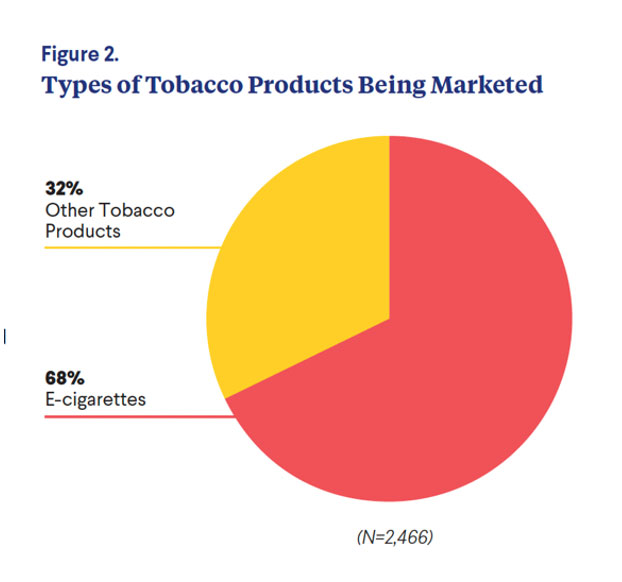E-Cigarette Brief
We are sharing the key findings of the E-Cigarette Issue Brief: Vape Tricks in Indonesia: How E-Cigarette Companies Use Social Media To Hook Youth launched on March 30, 2022.
We are sharing the key findings of the E-Cigarette Issue Brief: Vape Tricks in Indonesia: How E-Cigarette Companies Use Social Media To Hook Youth launched on March 30, 2022.
Vital Strategies reports on how tobacco companies in Indonesia and India use social media to market bidi and novel addictive products such as e-cigarettes due to the absence of tobacco advertising, promotion, and sponsorship (TAPS) regulations for digital media platforms. In addition to a TAPS ban, international cooperation is also required to enforce marketing restrictions on the internet.
Comparatively, in India, where e-cigarettes have been banned since 2019, they are marketed less often than conventional tobacco products on social media; our TERM India data shows that less than 10% of online tobacco marketing in India is for e-cigarettes. However, despite the ban, a recent study by Campaign for Tobacco-Free Kids in collaboration with the National Law School India University documented that 26% of youth in India have reported seeing e-cigarette marketing online, though only 4% reported using e-cigarettes since the ban came into force. This highlights both the bans’ encouraging results, as well as the need for continued monitoring of content on social media platforms.
This report cited the example of India, where young people are still being exposed to e-cigarette marketing online, despite a nationwide ban. The report offers insights especially for Indian policymakers as they review COTPA amendments.
Important considerations include:
Vital Strategies reports on how tobacco companies in Indonesia and India use social media to market bidi and novel addictive products such as e-cigarettes due to the absence of tobacco advertising, promotion, and sponsorship (TAPS) regulations for digital media platforms. In addition to a TAPS ban, international cooperation is also required to enforce marketing restrictions on the internet.
Comparatively, in India, where e-cigarettes have been banned since 2019, they are marketed less often than conventional tobacco products on social media; our TERM India data shows that less than 10% of online tobacco marketing in India is for e-cigarettes. However, despite the ban, a recent study by Campaign for Tobacco-Free Kids in collaboration with the National Law School India University documented that 26% of youth in India have reported seeing e-cigarette marketing online, though only 4% reported using e-cigarettes since the ban came into force. This highlights both the bans’ encouraging results, as well as the need for continued monitoring of content on social media platforms.
This report cited the example of India, where young people are still being exposed to e-cigarette marketing online, despite a nationwide ban. The report offers insights especially for Indian policymakers as they review COTPA amendments.
Important considerations include:
- Online marketing of tobacco products is not regulated in India. Vital Strategies has previously reported that Bidi marketing is prevalent on social media in India. The report can be accessed here: https://www.vitalstrategies.org/resources/selling-death-on-social-media/
- E-cigarette sales are banned in India, but there is a multitude of online stores and retailers selling these products on social media.
- Tobacco marketing is moving online where the majority of the users are young and digitally savvy. India and Indonesia's populations have a huge online presence. In 2020, about 580 million Indians use social media, and this is expected to increase to 1.5 billion in 2040 (statista.com). In 2020, it was estimated that about 200 million Indonesians use social media (statista.com)
- Knowledge, attitude, and behavior of young people may change due to exposure to online e-cigarette marketing by “influencers,” leading to social acceptability and re-normalizing of smoking among youth.
- TAPS ban on digital platforms is a winning strategy to reduce tobacco use/nicotine addiction and to prevent smoking initiation among young people.
Vape Tricks in Indonesia: How E-Cigarette Companies Use Social Media To Hook Youth
This report offers a first-of-its-kind look at e-cigarette marketing on social media in Indonesia, which has effectively no regulations on e-cigarettes and one of the world’s largest populations of social media users.
E-Cigarette Brief Key findings:
- Marketing of e-cigarettes is proliferating on social media, particularly on Instagram (58%), which is a platform popular among young people.
- More than two-thirds of the marketing we observed online was for e-cigarettes (68%), whereas only 32% was for conventional tobacco products like cigarettes.
- E-cigarette companies are directly marketing products (85%) with clear images or videos of the products. Accounts and posts promote links to online stores and apps where purchases can be made.
- E-liquids contain addictive nicotine which harms the developing brain
- These products are being marketed, primarily toward youth, as a daily-use consumer good or as high-tech gadgets

E-Ciggarette Brief
Recommendations:
- Counter e-cigarette industry narratives, especially the glamorous, entertaining and informational content that attempts to normalize and embed these harmful products in youth culture.
- Educate and alert consumers, especially youth, so they will recognize harmful marketing tactics.
- Protect young people from being targeted by e-cigarette companies by developing and enforcing stronger regulations to restrict the marketing and sale of e-cigarettes, especially online where many young people are exposed to these tactics.
- Monitor and report regularly to support stronger restrictions on tobacco marketing.
Methodology: The study Tobacco Enforcement and Reporting Movement (TERM) closely monitors instances of online tobacco marketing in Indonesia, India and Mexico, and provides the evidence base for decision-makers and advocacy groups.
This analysis was based on six months of data (Aug. 16 to Dec. 15, 2021) that was collected through our digital media monitoring system, the Tobacco Enforcement and Reporting Movement (TERM), from publicly available posts on social media platforms including Facebook, Instagram and Twitter, and from online media articles. Visit the TERM website to learn more.
India study source: https://citytoday.media/2022/03/03/e-cigarettes-are-being-advertised-through-instagram-despite-ban-reveals-survey/amp/